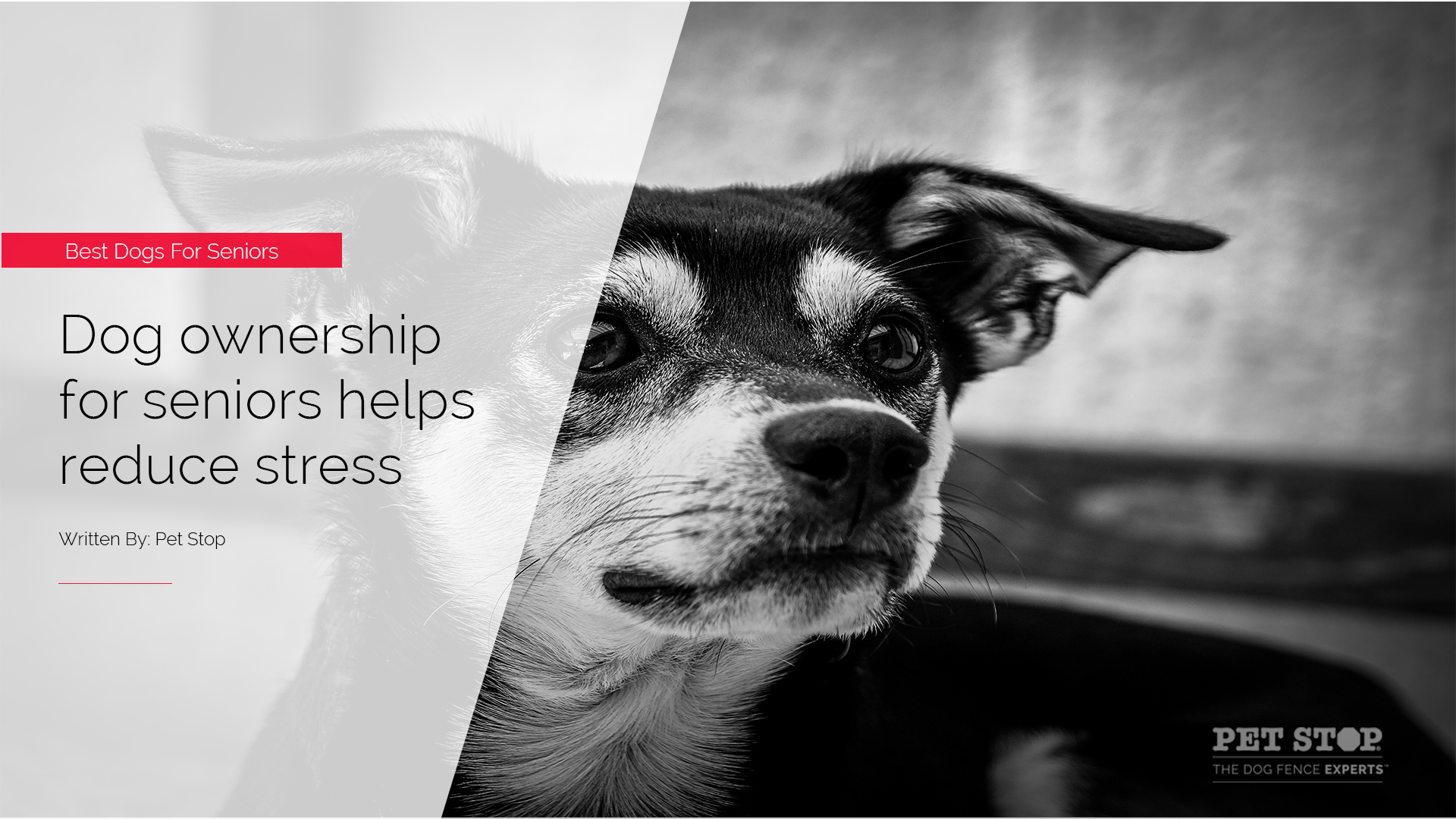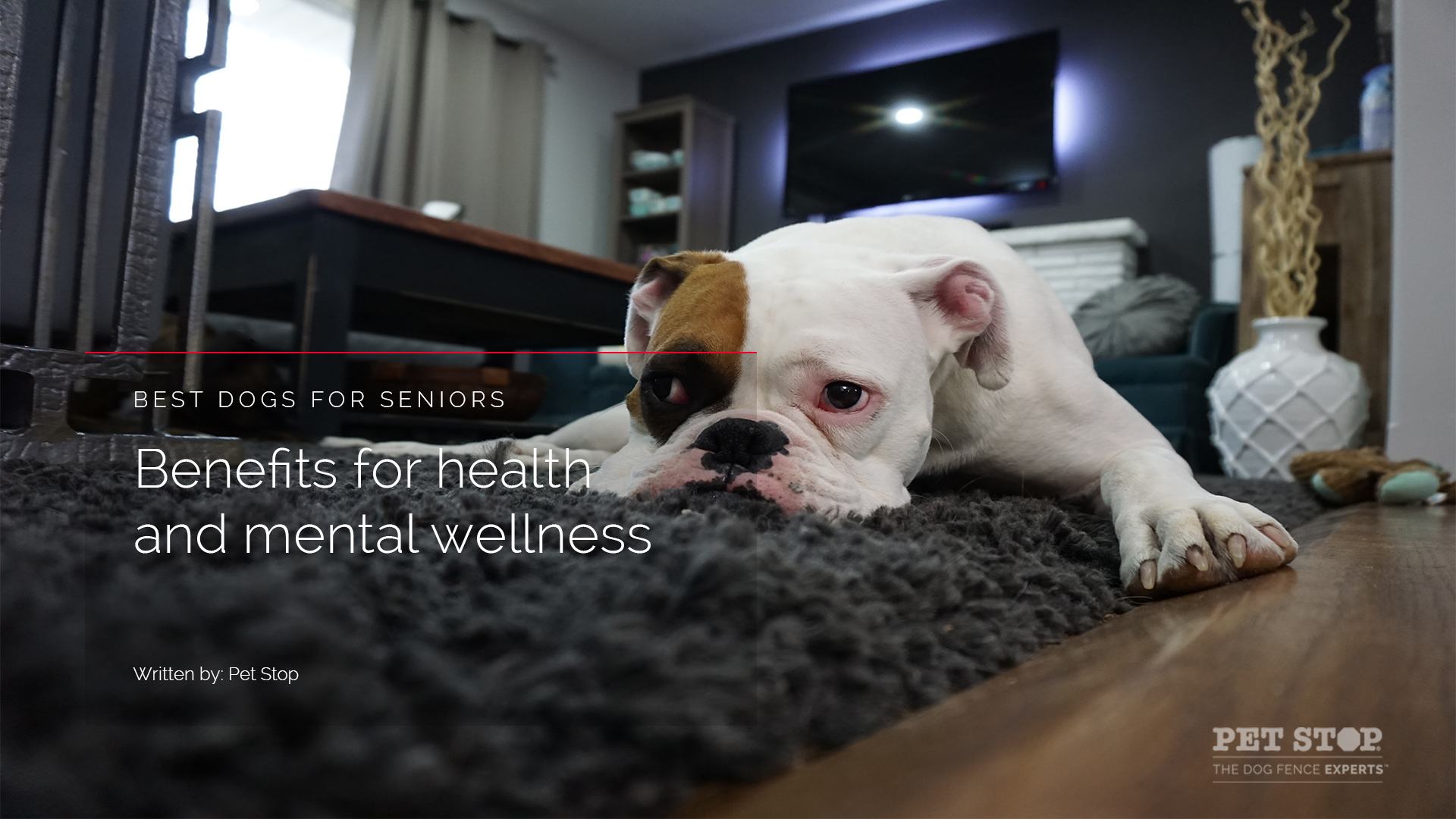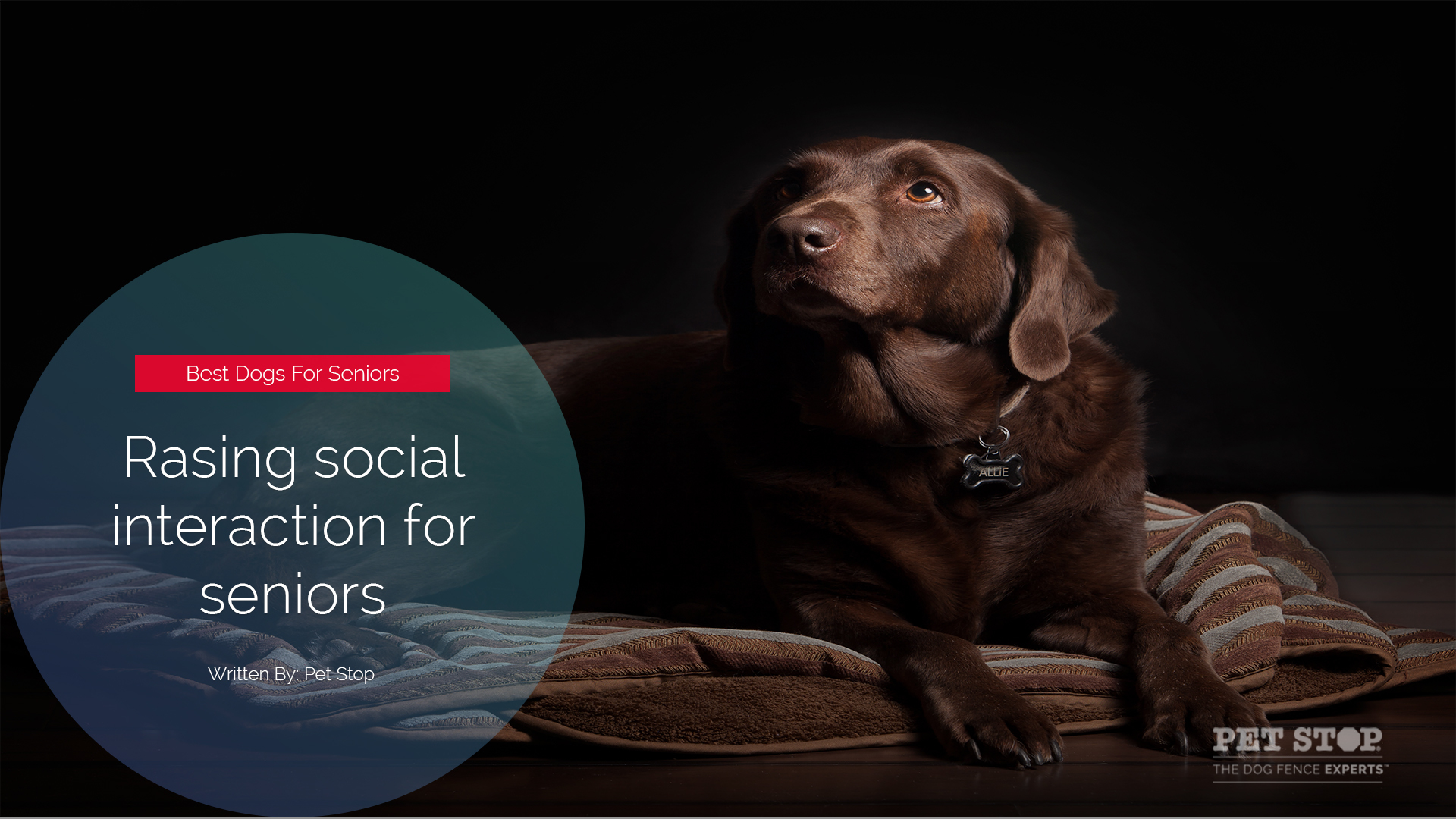Best Dogs for
Seniors
Are you searching for the best dogs for seniors? We’ve compiled the ultimate resource guide which includes answers to almost all of your questions! Make sure to read the article all the way through as we discuss everything from benefits of owning a dog as a senior, the most popular and unpopular breeds, expenses and costs associated with owning a dog, dog size, temperament, life expectancy and much much more.
Let’s dive right in!
To start, let’s dive into some statistics. According to a 2015-2015 survey by the American Pet Products Association or APPA, approximately 65% of all U.S. Households own a pet. Which equates to about 80 million homes!
After analyzing the survey results further, dogs are still the number one choice for pet ownership with about 55 million households owning a dog and about 43 million households owning cats. Buying a dog and introducing them to the family is one of the most joyful experiences someone can have and if after reading this article you decide to to move forward, let us be the first to say, “Welcome to the family!”
And you might be thinking to yourself, “that sounds exciting and I’m right on the fence, but I’m just not sure where to start or what kind of dog to get! I mean, there’s so many breeds, i’ve never owned a dog and i’m just not sure what to look for.”
Don’t worry. That why we’ve written this article. To provide you the ultimate guide to choosing the best companion dog for seniors.
To start let’s explore the huge list of benefits that comes along with owning a dog as a senior.
Top 10 Benefits For The Elderly and Dog Ownership
#1 Dog ownership for seniors helps reduce stress.
During the later years of your life, there could be a variety of factors in your life that may cause stress such as declining health, financial restrictions, loneliness or loss of loved ones like a husband or wife. By adopting a dog into your family, you’ll naturally reduce those feelings of stress by having a happy, loving pet around that will help put a smile on your face.
#2 Elderly People Tend to Increases Physical Activity With Dog Ownership
This is one of the top benefits you can experience as a dog owner in your later years because of the natural increase you’ll receive in movement around the house and neighborhood. Taking your dog on walks and out to the bathroom is a great way for seniors to get some light physical activity into their routine.
Because your muscles aren’t getting as much exercise as they used to in your younger years, walking, bending at the waist and accommodating your dog’s natural energy levels helps you get the blood flow your body needs to keep healthy.
#3 – Having a Dog as a Senior Helps Increase Social Interaction with Other People
This is a great way to keep your brain stimulated and prevent feelings of loneliness. There’s a special connection between people who own dogs and you’ll often find that when you are your pup are out on a walk and happen to pass by another people and their dog, you’ll stop, have a nice chat and enjoy the presence of your dogs playing and getting to know each other.
This gives you the opportunity to meet new people in your neighborhood and build your network of local friends. You can even set up doggy play dates which allows for an opportunity to enjoy quality time with a local neighbor or friend. It’s also a great excuse to get out of the house.
#4 – Lower Rates of Depression by Elevating Important Neurotransmitters Like Serotonin & Dopamine
Let’s face it, no matter what seems to be happening in your life, dogs have an uncanny ability to raise our spirits and bring us to the present moment. How can you ignore the the innocent look of a happy, loving dog as they approach you to play and cuddle? Having a dog in your later years as a senior is a great way to help elevate your mood by having a best friend who has unconditional love around you all the time.
#5 – Seniors Who Have Dogs Tend to Care For Themselves Better
Dogs really are a man’s best friend. But owning a dog comes with a certain level of responsibility. This added level of responsibility tends to carry over into one’s own life once they get a pet. Because they start to build their discipline muscle to take care of their pet, they naturally tend to follow through on their own personal responsibilities as well. Getting a dog in your older years is a great way of adding a level of accountability to your life that will ensure you continue to take care of your own health and well being as well.
#6 – Having a Dog Helps Create Routine In Your Life
As humans, we naturally crave some sort of structure or routine in our lives. As we approach our later years in life, many people are getting ready or have already retired. During this phase of our life we typically have less structure and routine because we aren’t going to work, our children (if we had any) are out of the house and we’re typically left alone or with our partner in the house without as much responsibility as we had before.
A great advantage that comes with having a dog as a senior is that you’ll start to establish a daily routine which includes but is not limited to feeding your dog, walking your dog, taking them to the bathroom, cleaning, grooming and training.
#7 – Having a Dog as a Senior can be a Source of Protection
Around the house, many dogs tend to bark if they hear or see strangers approaching. This can provide an added level of protection to your home because most thieves won’t want the additional hassle of dealing with an aggressive or angry dog as they make an attempt to rob you. Of course, most seniors tend to have dogs that are smaller in stature, but the thieves won’t know that!
#8 – Investing in Another Life Can be Beneficial For Health and Mental Wellness
In your later years, one of the most powerful investments you can make is in another life. This is important because when you’re older and you don’t have as many people to take care of, you could naturally incur feelings of loneliness and lose a certain sense of purpose. By getting a dog that you have to support, take care of and be there for, you could regain that sense of nurturing responsibility. This has positive effects both mentally and physically.
#9 – Having a Dog as a Senior May Improve Heart Health
Some studies have shown that owning a dog in your later years lowers a person’s heart rate and are even more likely to survive a heart attack compared to non dog owners. What’s even more surprising is that male pet owners in particular tend to experience a reduced rate of heart disease as well.
#10 – Senior Dog Ownership May Reduce Blood Pressure, Cholesterol and Triglycerides
Here’s some research behind the case:
“In the study of 1,570 peopled aged 60 years or over, owning a dog was associated with a 3.34 mmHg decrease in systolic blood pressure. Dr. Ragavendra Baliga, a cardiologist and professor of internal medicine at Ohio State University’s Wexner Medical Center, told The Columbus Dispatch:”
“To put that into perspective, even a 2 mm reduction in systolic blood pressure is associated with a 6 percent reduction in stroke, a 4 percent reduction in coronary heart disease and a 3 percent reduction in overall mortality.”2
Phew! That’s a pretty resourceful and exhaustive list of benefits. It seems as though almost every sign points to owning a dog once you move into your older years as a senior.
Of course, that’s assuming that you’re in generally good health and you have the ability to take on the responsibility of having a dog.
Now that we’ve explored some of the great benefits that come along with owning a dog in your later years, let’s explore some of the different criteria someone should considering when making the leap to dog ownership.
Because this list may get extensive, we won’t too deep into each point, but will list them for consideration nonetheless.
Here are some of the criteria and qualities (in no particular order) you should consider when choosing a companion dog as a senior.
What Size Dog Do You Want?
Small Dogs
Small Dogs offer many advantages including being easier to walk, they’re easier to take places, they’re easy to bathe, they’re usually less aggressive, easy to cuddle with, you can dress them, they can sleep with you and they usually tend to live a little longer than larger dogs. Small dog breeds overall seem to be the recommended choice by man as the preferred types of dog for seniors.
Medium Sized Dogs
Adaptable in size so they can make good apartment dogs, they fall in the middle of budget when it comes to costs for things like food or toys. They live in the range of 10-14 years on average, traveling is a little bit more difficult. They may be more difficult to walk and temperaments may vary as well.
Large Sized Dogs
Many enjoy lagers dogs if they own large spots of land or live in suburbs or rural areas. For seniors however, they can be a bit more difficult to manage and take care of. Larger dogs typically cost more money to maintain. They also require more exercise and like to have more freedom in their space and movement. They do however add a higher level security and protection over medium and small dogs which is a great advantage if that happens to be important to you. Their temperaments can vary but are generally calm. They’re more difficult to travel with and have shorter life spans than small dog breeds.
What is your budget for adopting a dog? Small dogs tend to be cheaper than larger dogs to take care of. Consider food, grooming, toys, medical attention.
What are your specific needs of a dog? What are you looking to get out of having a pet?
How much space do you have in your home?
Do you want a purebred or mixed breed?
What is the lifespan of the dog?
How often do you travel? And do you want your dog to travel with you?
Do you have any specific medical needs that may affect dog ownership?
Do you have any allergies to dog dander?
What is the level of physical activity you’d be willing to engage in with your dog?
What kind of temperament are you looking for in a dog?
After a thorough analysis and look into these criteria you should be well equipped to come to a more educated choice about what kind of dog you want to have.
But of course, this isn’t the end of it. Now that we’ve considered the benefits and have explored the criteria for owning a dog, let’s dive into the most popular breeds of dogs for seniors.
First we’ll explore the best dog breeds for seniors by category so that we can narrow the lists down.
Categories and Information on Dogs for Elderly
Best Dog Breeds for Seniors That are Tiny or Small
Dogs that Have Low Energy
Small, Quiet Dogs
Dogs That Are Easily Trained
Small Watch Dogs
Dogs that are Allergy Friendly
Small Lap Dogs
While there may be more to consider, these seem to be the most popular amongst seniors looking for a dog. Many of these dogs make great house dogs and are great retired dog breeds.
Let’s dig in to our comprehensive list of companion dogs for the elderly.
Best Dog Breeds for Seniors that Are Tiny or Small
If you’re looking for a small dog that is easy to handle and size is very important to you, consider these breeds:
- Chihuahua
- Pomeranian
- Maltese
- Yorkshire Terrier
- Teacup Poodle
Dogs That are Low in Energy
Below are a list of dog breeds that are generally low in energy. If you’re looking for a peaceful pup, consider one of these below.
- Pekingese
- Cavalier King Charles Spaniel
- Japanese Chin
- Shih Tzu
- Pug
- Bolognese
Quiet Small Dogs
If you’re looking for a quiet dog that doesn’t bark around the house, then these dog breeds are for you.
- Bolognese
- Shih Tzu
- Japanese Chin
- Cavalier King Charles Spaniel
Dogs That are Easily Trained
Easily trained dogs make for a fun, loyal companion. Here’s a list of some of the more intelligent dog breeds that are the most easily trained by elderly folks.
- Poodles
- Schnauzers
- Boston Terriers
Need a Small Watch Dog?
Here are some great small watch dog breeds for seniors.
- Schnauzer
- Poodle
- Scottish Terrier
If you Suffer From Allergies, Consider These Breeds
Are you a senior with Allergies? Here is a list of the most hypoallergenic dog breeds for seniors.
- Poodle
- Mini Schnauzer
- Shih Tzu
- Yorkshire Terrier
- Maltese
- Bolognese
Looking for a Lap Dog?
If you’re looking for a loveable lap dog, then consider these breeds below.
- Shih Tzu
- Maltese
- Yorkshire Terriers
- Chihuahua
Now that we’ve categorized our best dog breeds for seniors, lets dive into our Top 10 list of best dogs for seniors which has been rated amongst dog owners across the most popular pet blogs, forums and surveys!
10 Best Dogs For Seniors
Use this list as guidance when selecting your perfect dog. Remember that you should also take into considering all of the other criteria we discussed about as well as the categories we covered to ensure you pick the right dog for you.
- Maltese
- Shih Tzu
- Boston Terrier
- Miniature Schnauzer
- Poodle
- Yorkshire Terrier
- Pekingese
- Bolognese
- Pug
- Cavalier King Charles Spaniel
Each and every dog is special and equally loveable, it all just depends on what you’re looking for out of a companion.
Here are some additional dogs that didn’t quite make the top 10 list but are great dog breeds for seniors
- Japanese Chin
- Dachshund
- Pomeranian
- Beagle
- Scottish Terrier
- Chihuahua
Now that we’ve listed out the most popular dog breeds for seniors, let’s quickly list out some of the more unpopular dog breeds that seniors tend to stay away from.
#1 – Australian Shepherd
Great working dogs, but require an extraordinary amount of attention. They aren’t great lap dogs and require someone to play with them all the time. They’re working, herding dogs, so they don’t make great breeds for seniors.
#2 – Border Collie
Like Australian Shepherds, Border Collies need lots of attention and are working dogs. They require constant attention and need to be maintained and groomed weekly.
#3 – Cocker Spaniel
Cocker Spaniel’s are very beautiful and loving dogs, however they also require a great deal of maintenance and have a lot of energy. They have a higher requirement for training and are prone to getting ear infections so a weekly inspection is a must. Unless you have a lot of time and energy to spend with them, Cocker Spaniels do not make a great breed for seniors.
#4 – Jack Russell Terrier
This is another high energy hunting dog, specifically fox hunting. While they may be small which is an advantage for older folks looking for a companion, they are known to have high energy and to be jumpers and chasers. You generally need to have more space for this breed than others and they’re fairly difficult to train because of their lack of discipline.
#5 – Pit Bull
This breed is known for being aggressive, however they can also be very sweet if trained from an early age. They require a lot of patients and can grow to be pretty large so apartment homes and condo’s are not the ideal setting for this type of dog.
Some other dog breeds which we don’t recommend for seniors are rottweilers and labrador retrievers because of their size, maintenance and high energy levels.
Always not that these recommendations are not set in stone, they are simply recommendations
Depending on the size of your home, your resources, energy levels and overall health, you can always choose to consider dog breeds from this list, but as a general consensus, these types of dogs carry more responsibility and are more difficult to maintain.
Many seniors enjoy lap dogs because they provide a more intimate level of relationship and connection as they can generally sit with you on the couch or be taken with you anywhere you go.
Lap dogs are known for their affectionate, happy and loving personalities. If you’re a senior looking for a great lap dog, here are our top picks.
Top 10 Best Lap Dog Breeds:
Cavalier King Charles Spaniel
Weighing Between 10-18 pounds, these eager affectionate and happy dogs are perfect for sitting on your lap!
Havanese
A bit smaller in size than our first breed, these dogs are cute, approachable and weigh around 7-13 pounds.
Maltese
Maltese are known for being just tiny. Weighing in around 6-9 pounds, they are truly an ideal lap dog.
Shih Tzu
Shih Tzu’s are great lap dogs coming in at just about 9-16 pounds They’re have quite a personality!
French Bulldog
A bit heavier than the others on our list if the French Bulldog. They’re easy going, playful and loving. They weigh an average of about 18-28 pounds.
Pekingese
Brave, sensitive and cute. These fluffy dogs come in very light at about 6-10 pounds are are very devoted to their humans!
Tibetan Spaniel
This breed was designed to accompany royalty. At 9-15 pounds they are happy to take any lap and call it their throne.
Pug
Who can pass up on such a cute and unique face? With their animated features, pugs love being the center of attention. They weigh in around 13-20 pounds and they love to cuddle.
Boston Terrier
Weighing in at 10-25 pounds, these little love balls are devoted to their humans and love a nice cuddle on the couch.
Chiahuahua
Coming in as one of the lightest breeds, chihuahua’s weigh in at 3-8 pounds making them one of the lightest lap dog breeds you’ll come across.
If you’re a senior getting ready to buy a dog or related to one and looking for the ultimate resource that will help you make your final decision, we hope you’ve learned what to look for in our article!
And remember, these are just our recommendations based on what we’ve found through some great resources online and in surveys. Ultimately, choosing the right dog is up to you depending on your requirements and what you’re looking for.
Let us know in the comments below what you thought about our article and what breed you ended up selecting!
 Pet Stop
Pet Stop Get a Free Quote
Connect with Your Local Pet Safety Experts at Pet Stop. Visit, call, or
chat with us – we’re here to help you create the ultimate safe haven for your pet.
Get a Free quote
Name *
Zip code where new fence is required *
Preferred contact method *
Phone Number to Call/Text *
Address *
Stay Connected, Stay in Control
Brief introduction to the OT-300, highlighting remote control, real-time notifications, and easy setup through the Pet Stop Link App.
Download the App


